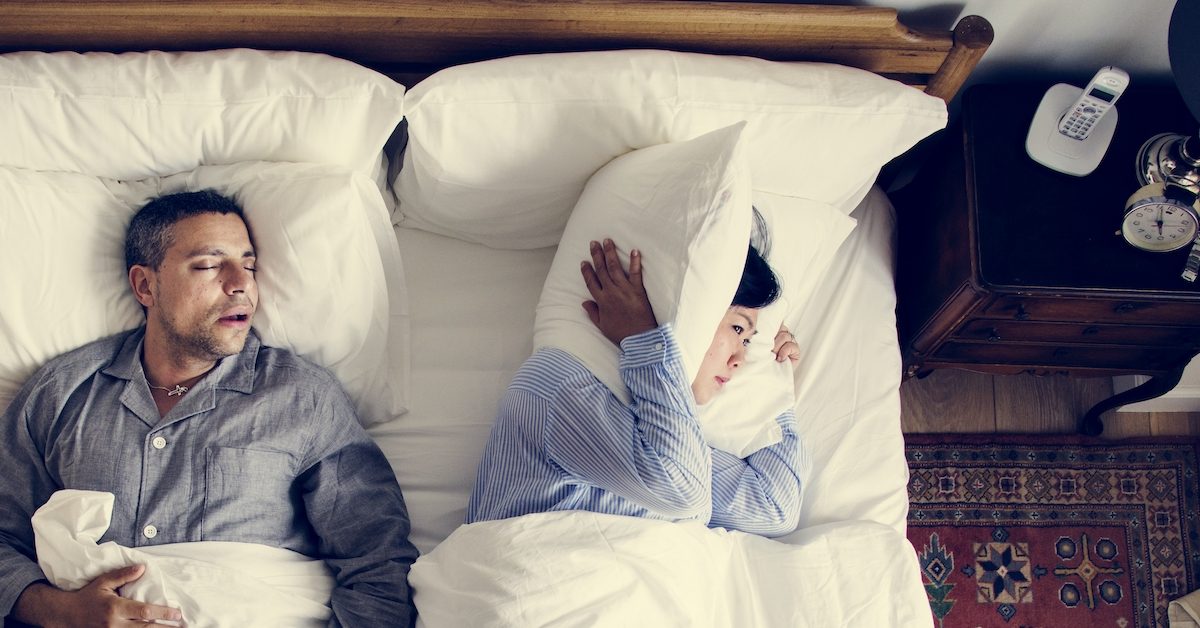Blog
February 23, 2020 • 5 min readThese Stats About Snoring Are Alarming
Snoring is a sign of a deeper problem and science has recorded alarming stats about it. Seek diagnosis and treatment for sleep disorders causing snoring.
Author

Joe Magness, DDS
Devdent CEO

In this Article
Snoring… It’s annoying if you’re not the one doing it, it’s a potential sign of a deeper problem for the snorer, and science has recorded some pretty interesting facts about snoring. These stats about snoring are alarming. However, don’t let them scare you; instead, take it as inspiration to seek diagnosis and treatment if there is a sleep disorder causing your or your loved ones’ snoring problem.
The Most Alarming Snoring Statistics
1. 25% of the population are regular snorers, 45% snore sometimes, and about 10% of children snore.
2. Snoring is found in both men and women, including all age groups, 40% of men snore regularly versus only 24% of women.
3. Pregnancy can bring on snoring for women who didn’t snore before. Often due to nasal congestion and weight gain, it can be linked to sleep apnea as well as high blood pressure and gestational diabetes.
4. Female snorers are typically shorter in height and weigh more than women who don’t snore.
5. In most cases, snoring gets worse with age. The percentage of snorers increases with each age group. 30% of the 30+ range snores, while 40% of middle-aged people snore. On the contrary, men over age 70 are LESS likely to snore.
6. Speaking of age, not all children who snore have sleep apnea. Allergies or respiratory infections commonly cause Their snoring. If your child is part of the 5.6% who snore regularly, that is alarming snoring that warrants getting a sleep test done to diagnose any underlying causes.
7. Similarly, not all adults who snore have sleep apnea. But with 50% of snorers also having sleep apnea, you will want to seek a diagnosis and treatment for snoring no matter what.
8. Snoring is the most common symptom of sleep apnea, with 70-95% of those suffering from obstructive sleep apnea being regular snorers.
9. You aren’t always aware of your snoring. Only 59% of snorers reported that they snore.
10. Your average snore rings in at 38 decibels, but the loudest snore on record was 120 decibels. That’s some alarming snoring. An emergency vehicle siren is 115 decibels!
11. Snoring can happen during any stage of sleep.
12. Snoring isn’t just bad for the snorer; it’s terrible for their bedmate’s rest. Studies show that 80 to 90% of snoring bedmates face difficulty reaching REM sleep. Additionally, women with partners who snore are three times more likely to have insomnia.
13. Unfortunately, the third leading cause of divorce in the US is, you guessed it, snoring! The alternative is that many couples end up sleeping in separate rooms.
14. In an Australian sleep study, 23% of people with snoring partners claimed that mating possums make less annoying sounds than their partner. No wonder snoring leads to arguments and 40% of the people in this study claiming that it affected their mood.
15. 95% of snorers claim that an oral appliance helped reduce their snoring.
16. People who snore have an 80% increased risk of insulin resistance. Meaning that snoring is a risk factor for Type II Diabetes, as insulin resistance is a prediabetes state.
17. Regular snorers face an increased risk of heart disease that is five times higher than people who only snore occasionally. As a result, habitual snorers have a greater chance of hypertension, stroke, and high cholesterol.
18. Sleep position can play a role in snoring. Back sleepers have gravity to thank for their partially closed airway due to the tongue and soft palate falling to the back of the throat. A quick snoring solution: Try sleeping on your side!
19. You may not believe your snoring partner when they say it runs in the family, but that can be true. Lifestyle factors play a significant role in snoring, yet there are some genetic factors regarding the size and structure of the airway. You can inherit from your family a long uvula and soft palate or enlarged tonsils and adenoids.
20. Lifestyle factors linked to snoring include alcohol and depressants. Both of these relax the throat muscles, resulting in potential collapse and closing of the airway.
21. Those “sometimes snorers” likely are snoring when they have a cold, allergies, or nasal congestion because that causes airway obstruction.
22. The number 1 side effect of snoring is daytime fatigue, which often includes trouble concentrating and thinking clearly.
What should you do about it?
We all know someone who snores, and it can even add unwanted pressure to relationships. With modern technology, there are conservative treatment options that can put a stop to snoring. There are various treatments and therapies to either reduce snoring or treat the underlying cause, such as sleep apnea. Because snoring is the most common symptom of sleep apnea, it is highly recommended to talk with a healthcare provider, such as your dentist, about your sleep health. In most states, you can get a home sleep test that you take in your bed and is later reviewed and diagnosed by a board-certified sleep specialist. Then, you can discuss a treatment plan that is right for you and your diagnosis. Before long, you will be on your way to better sleep, better health, and a happier relationship!



